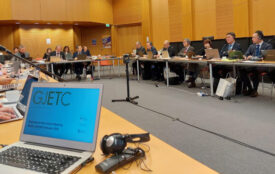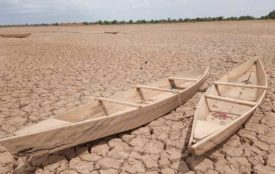Gauck calls on the UN to “finally initiate the necessary measures” to protect the climate
DBU: German president today presented the most lucrative European environmental award in Essen
German President Joachim Gauck today praised the new “outstanding recipients” of the German Environmental Award of the Deutsche Bundesstiftung Umwelt (DBU) as “personalities to whom we have much to be grateful for and who deserve the honour they are receiving today: you give us new heart!” The climate and marine researcher Prof. Mojib Latif (61, Kiel) and the globally active sustainability scientist Prof. Johan Rockström (49, Stockholm) received what is the most lucrative European independent environmental prize in Essen today from the hands of Gauck and RitaSchwarzelühr-Sutter, the chair of the DBU Board of Trustees and Parliamentary State Secretary in the BMUB. The two prizewinners each receive 245,000 euros. Em. Prof. Michael Succow (74, Greifswald) was honoured for his lifelong commitment to nature conservation with the Honorary Lifetime Achievement Award, worth 10,000 euros, which the DBU has presented only four times previously in addition to the main award.
“Leaving children with a world in which things that should be a matter of course are treated as such”
Speaking to some 1,200 guests – including the premier of the state of North Rhine-Westphalia (NRW), Hannelore Kraft, and NRW’s Environment Minister Johannes Remmel – Gauck said the three prizewinners were working towards “leaving our children with a world in which people can breathe fresh air, drink clear water and harvest on healthy soil – in other words, in which things that should be a matter of course are treated as such.” Rockström, he said, had calculated objective tipping points for the Earth with his concept of planetary boundaries, thus enabling political decision-makers to establish priorities in protecting the environment and nature. Latif had been drawing attention for years to the fact that our planet would become uninhabitable without intact oceans and had the gift of conveying complicated matters in a simple and understandable manner, he said. And he described how in 1990, the year of German reunification, Succow, as a brilliant networker in the area of German nature conservation, had ensured the protection of some 4.5 percent of the area of East Germany while deputy environment minister and thus laid the foundation for the national park programme in the whole of Germany.
The “eternal costs” are higher, the longer appropriate measures are delayed
Gauck pointed out that everything that must be planned and done to preserve and improve the environment could and needed to be calculated in long time frames, warning that a change of direction could never be undertaken too early, as its effects would only be felt slowly. Ecosystems such as climate and soils changed very gradually, he said, meaning that we did not have forever to prevent serious or even catastrophic damage. If scientists irrefutably proved that changes were needed in areas of economy, technology, production or transport, those changes should be undertaken at a political level, the president urged. Gauck: “At any rate, we do not have as much time to end and reverse the changes that are making the climate hostile to life as we have had since the beginning of industrialisation to set off those changes.” For this reason, he said, he hoped that the United Nations climate conference that is soon to begin in Paris would “finally initiate the necessary measures in this regard”, warning that according to all scientifically reliable predictions, the “eternal costs” for climate protection would be higher, the later appropriate measures were initiated.
Recognising soil as a valuable, limited asset
The president praised the successes achieved in structurally transforming Germany’s Ruhr area. He also mentioned the rehabilitation of the Emscher River as an example and symbol that has been recognised nationally, and possibly even Europe-wide, of how it was possible to bring about a radical improvement in the environment. In his speech, Gauck also focused on the necessity of protecting soil, saying that it was in extreme danger, with millions of hectares of fertile land being lost worldwide every year. He said that if the world’s population continued to grow at the current rate, it was possible that, by 2050, only half as much arable land would be available per person as today. Soil must be recognised as a valuable, limited asset that should be used only with care, according to Gauck.
Treat food more carefully and end its wasteful destruction
The president said that within a very short space of time, large-scale clearing, soil sealing, over-fertilisation and mono-cultures had destroyed tracts of fertile land that had been created over thousands and thousands of years. He warned that it was high time to draw attention to what was a central basis for existence, saying that the loss of land must be slowed and the recultivation of soil accelerated. Gauck stressed that developed nations in particular had to end the huge waste of soil capacity by making people treat food more carefully and stopping its wasteful destruction. The sustainability goals recently decided upon by the United Nations also served to protect soil, he said. They included sustainable forest management and the fight against desertification, soil degradation and the loss of species diversity, all tasks that had to be tackled with resolve, according to the president.
Unlimited material growth not possible if the Earth is limited
As members of the jury of the German Environmental Award whose proposals form the basis for the DBU Board of Trustees’ selection of prizewinners for a given year, Prof. Martin Faulstich, chair of theGerman Advisory Council on the Environment, and Prof. Sabine Schlacke, member of the German Advisory Council on Global Change, also spoke about the achievements of the 2015 prizewinners. Faulstich commended the similar way of thinking shared by professors Latif and Rockström. He said both of them had strongly influenced the work of the German Advisory Council on the Environment for the past ten years. According to Faulstich, they made a “powerful contribution”, provided “fundamental insights” and promoted the realisation that unlimited material growth was not possible if the Earth was limited. With their choice of prizewinners, the jury and the DBU had thus wanted to send a strong and effective signal ahead of the UN climate conference in Paris at the end of November, he said.
“You can’t negotiate on costs with nature”
Faulstich said that Rockström stood for the realisation that sustainable life was possible only within certain boundaries, “because you can’t negotiate on costs with nature.” He said that Latif was a scientist who was able to convey the knowledge he created to a wide audience. Faulstich: “Otherwise, it stays in an ivory tower.” There was no alternative to decarbonisation and abandoning the use of coal, he said. Faulstich: “The enthusiasm of the prizewinners rubs off on us. And I hope it continues to do so for a long time.”
Took the right decision at “a historically unique moment”
Schlacke spoke of Succow’s achievement, saying that there were often times in life when it was a matter of making exactly the right decision at exactly that moment. She said Succow had used this “historically unique moment” when, as East German deputy environment minister in the year of Germany’s reunification, he ensured that 4.5 percent of the area of East Germany was classified as protected. This was an “investment that we can still make the most of today”, and one that had also had consequences for nature conservation in western Germany, she said. She described Succow as possessing an extraordinary love of nature and as an outstanding scientist who had drawn conclusions from his discoveries and acted upon them. His credo, she said, was not to protect nature from humans, but to achieve harmony between nature and human usage of nature. Schlacke: “For this, we owe you very great thanks.”








